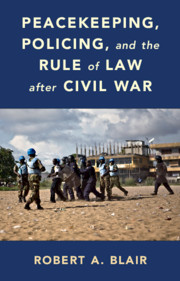Book contents
- Frontmatter
- Contents
- List of Figures
- List of Tables
- Acknowledgements
- List of Abbreviations
- 1 Introduction
- 2 History of UN Intervention and the Rule of Law after Civil War
- 3 Conceptual Framework: Civil War through a Legal Lens
- 4 Theoretical Framework: Restoring the Rule of Law after Civil War
- 5 Cross-national Evidence: UN Intervention and the Rule of Law across Africa
- 6 Sub-national Evidence I: The Rule of Law and Its Discontents in Liberia
- 7 Sub-national Evidence II: Evaluating the UN from the Bottom-Up
- 8 Sub-national Evidence III: UN Intervention and the Rule of Law in Liberia
- 9 Implications for Africa and beyond
- Bibliography
- Index
8 - Sub-national Evidence III: UN Intervention and the Rule of Law in Liberia
Published online by Cambridge University Press: 09 November 2020
- Frontmatter
- Contents
- List of Figures
- List of Tables
- Acknowledgements
- List of Abbreviations
- 1 Introduction
- 2 History of UN Intervention and the Rule of Law after Civil War
- 3 Conceptual Framework: Civil War through a Legal Lens
- 4 Theoretical Framework: Restoring the Rule of Law after Civil War
- 5 Cross-national Evidence: UN Intervention and the Rule of Law across Africa
- 6 Sub-national Evidence I: The Rule of Law and Its Discontents in Liberia
- 7 Sub-national Evidence II: Evaluating the UN from the Bottom-Up
- 8 Sub-national Evidence III: UN Intervention and the Rule of Law in Liberia
- 9 Implications for Africa and beyond
- Bibliography
- Index
Summary
Can UN intervention help create the necessary conditions for the rule of law at the local level in countries recovering from civil war? This chapter answers this question through a quantitative and qualitative case study of the UN Mission in Liberia (UNMIL). The case study combines an original three-wave panel survey with in-depth, semi-structured interviews conducted with dozens of UN personnel, citizens, local leaders, government officials, and civil society representatives in Liberia. The survey spans a period of four years, covers a wide range of topics, and captures the views of over 10,000 rural Liberians across three waves of data collection. The richness of this data helps isolate the causal impact of UNMIL's activities. The chapter demonstrates that UNMIL increased citizens' willingness to rely on the Liberian police and courts to resolve the most serious incidents of crime and violence, while reducing their use of illegal mechanisms of dispute resolution -- especially trial by ordeal. These effects persist even for at least two years, even in communities that report no further exposure to UNMIL personnel.
Keywords
- Type
- Chapter
- Information
- Peacekeeping, Policing, and the Rule of Law after Civil War , pp. 184 - 218Publisher: Cambridge University PressPrint publication year: 2020

